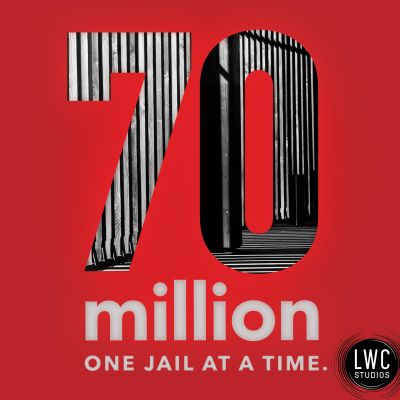This award-winning and Peabody-nominated podcast documents how locals are addressing the role of jails in their backyards. Reporters travel around the country and hear from people directly impacted by their encounter with jails and to chronicle the progress ground-up efforts have made in diversion, bail reform, recidivism, adoption of technology and other crucial aspects of the move toward decarceration at local levels.
http://www.70millionpod.com
Gesamtlänge aller Episoden: 1 day 6 hours 27 minutes
- 1
- 2
- 1
- 2
70 Million Podcast Teaser
Starting August 27, follow along as the reporters on 70 Million travel around the country to chronicle how communities are taking the challenge of criminal justice reform into their own hands, one jail at a time.
episode 1: 70 Million S1 Trailer
70 million Americans older than 18 have a criminal record. 70 Million documents how residents and communities are taking up the challenge of reforms, one jail--and story--at a time. We’ll travel around the country to learn about local efforts in diversion, bail reform, recidivism, and specialty courts--all with the goal of lessening the impact of jails on communities. (This podcast is made possible by a grant from the Safety and Justice Challenge at the John D. and Catherine T...
episode 1: Locals Divided Between Diversion and Border Security
In Pima County, where Tucson is located, formerly incarcerated individuals and local government officials have joined efforts to send fewer people to jail. Meanwhile, a federal program designed to stop drug and human trafficking at the border is also sending people to jail for months over traffic violations and minor drug offenses. Reporter Jesse Alejandro Cottrell explores just how complicated it can be to reform a local criminal justice system.
episode 2: Veterans Courts Give Soldiers a Way Back
For veterans, run-ins with the law don’t always have to mean jail time. Thanks to Veterans Court in Boston, which helps in finding treatment for PTSD, getting sober, and finding work. Reporter Heidi Shin talks to an Iraq and Afghanistan vet about his struggles with alcohol and PTSD, and his experience through the Veterans Court program. Heidi also talks to the judges, outreach specialists, and counselors about diverting veterans away from the prison pipeline.
episode 3: Reform Activists and a New DA Find Common Ground
Activists in Houston were galvanized by events in Ferguson in 2014 following the death of Michael Brown. First, they took to the streets in protest. Then they started organizing. Not long after, they found a kindred spirit in the most unlikely person: a candidate for the DA office. Reporter Ruxandra Guidi chronicles how activists and reformers are succeeding in cutting the jail population, diverting drug arrests, and increasing accountability for local police.
episode 4: Putting Women Already in Jail First
Oklahoma locks up women and girls at a higher rate than anywhere else in the US. Black mothers bear the burden of this crisis, which can curtail accessing public benefits and lower the chances of keeping their children. But a promising new public defender's office in Tulsa have found a way to change some women’s fates. Reporter Nissa Rhee goes inside a women’s jail for our story.
episode 5: One State Is Disrupting the Pipeline from Foster Care to Jail
By age 17, over half of young people in foster care have already been convicted of a crime or spent a night in jail. After they age out, a quarter will go to jail or get in trouble with the law within the first two years. California is determined to keep foster youth out of jail. Reporter Liza Veale profiles two young people who are making their way out of the system, and talks with policy makers and social service workers trying to redirect the foster-care-to-prison pipeline.
episode 6: In One State, an Opioid Crisis Led Police to Start an Angel Program
In Massachusetts, Gloucester PD started an "angel program" to help people in the grip of opioid addiction get help. Instead of arresting people for opioid-related crimes, police directed them to treatment programs and resources. The angel program eventually grew into PAARI, the Police Assisted Addiction and Recovery Initiative. It’s now a national program. Reporter Maria Murriel visits the original program to see how it all works.
episode 7: Undocumented Immigrants Are Tethered to ICE, and Private Companies, by Ankle Monitors
A handful of companies are making millions off ankle monitors strapped to undocumented immigrants in ICE custody. The makers pitch the monitors as an alternative to being jailed, but are they simply another form of bondage? Reporter Ryan Katz looks at what life is life while wearing one of these monitors. He untangles the complicated web of ICE, immigration bail agent companies, and the attorneys fighting them.
episode 8: In Miami, Jailing Fewer, Treating More
This episode is a special collaboration with Miami’s WLRN radio station, whose reporters Nadege Green and Daniel Rivero report on the county’s Criminal Mental Health Project which has been instrumental in diverting mentally ill people away from jail. They meet the judge to started the program and see how counselors, peer specialists, and officers are focusing on treatment and services rather than arrests...
- 1
- 2
- 1
- 2
